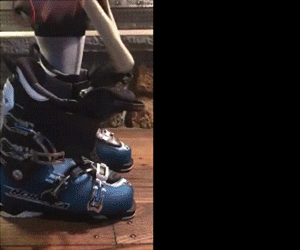I've heard that story a few times, and it's really amazing. So much bravery on the part of the musician, putting himself out there.
I should maybe mention that I catch myself judging EVERYONE, positively or negatively, without meeting them. I have preconceived notions about black people, hispanic people, rich people, poor people, fat people, skinny people, people with tattoos I like, people with tattoos I don't like, people with dogs, people who dress this way or that, people with certain jobs ..... OMG so much judging. Becoming aware of it on a conscious level has been ... enlightening, if not exactly fun. Maybe I'm the only person who has this, but I tend to suspect almost everyone does this, and many just haven't learned to hear their own internal voice.
And that's it exactly. One of the ways our brain helps us out is by providing short cuts to learning. If every time you heard the underbrush rustle in just that certain way you had to wait to see the tiger before you ran, that's a problem. So those impulses are rooted in the way the brain stores and processes information.
In fact Developmental Coordination Disorder is where children can't use movement maps created doing other physical things to help them learn to do new physical things. For instance (very simplified) not being able to apply skills learned in climbing steps to climbing ladders. That basic tendency to take things we already know and apply them to new people and situations is a learning strategy that serves us well.
So to me if I question my thoughts, and try to recognize where they come from and acknowledge them, it's much better than pretending they don't exist. It makes my goal to treat every person with dignity and respect because that's what they deserve as fellow humans, as opposed to being without bias, because I don't think that's possible.
The standard one that is so hurtful to so many upstanding black men is that when walking down the street, women walking towards them grab their purses and crossing the street. For me, if I flash in that situation (really any situation where I'm alone with anyone I don't know) I don't ignore it, I start running my mental heuristics/decision tree. I look at age, grooming, dress, style of walk, cleanliness, affect, energy, surroundings, things in the environment that might mean I'm safe, things in the environment that might make me unsafe (if there is a crack house next door, I don't care if I hurt your feelings, not safe) and I always, always look at the person, acknowledge them and their personhood, and nod my head or speak, regardless. Because if for no other reason than it is much easier to hurt someone who you don't see as a person, or who you are mad at because you don't feel like they see you as a person.
P.S. That also works on catcallers and oglers. One of these days (in a physically safe setting) stop and look at (and see) these men and ask them if they would treat their sister/daughter or mother that way. You'd be surprised at the response. And it might have a strong enough influence to stop them from doing it to anyone else.


